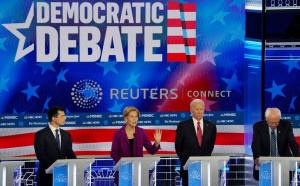Seven Democrats to take stage in post-impeachment presidential debate
 Send a link to a friend
Send a link to a friend
 [December 19, 2019]
By Ginger Gibson and Tim Reid [December 19, 2019]
By Ginger Gibson and Tim Reid
LOS ANGELES (Reuters) - A relatively small
lineup of seven Democratic presidential contenders will take the stage
for a debate on Thursday, one day after the House of Representatives
made Republican Donald Trump the third president in U.S. history to be
impeached.
The sixth debate in the race to pick a Democratic challenger to Trump in
the November 2020 election features the fewest participants since the
debates began in the summer, potentially giving each candidate a bigger
spotlight and more time to engage with one another.
The debate will also offer Pete Buttigieg, the mayor of South Bend,
Indiana, and U.S. Senator Elizabeth Warren a chance to renew their
intensifying campaign rivalry over transparency in fundraising and in
their past private-sector work.
But the debate's timing, coming a week before the holidays and amid the
impeachment fireworks in Washington, could reduce the audience and the
benefits for Democratic candidates seeking a boost ahead of the first
nominating contest in Iowa on Feb. 3.

The debate in Los Angeles follows the House's largely party-line vote on
Wednesday to impeach Trump on charges he abused the power of his office
to pressure Ukraine to investigate a political rival, Democratic
contender Joe Biden, and obstructed Congress' probe of the matter.
All the Democratic White House contenders have spoken in support of the
impeachment inquiry, but the historic prospect of a U.S. Senate trial in
January to determine whether to remove Trump from office is certain to
be a prime debate topic. The Republican-controlled chamber is likely to
acquit the president.
Three of the candidates on the debate stage, U.S. Senators Amy Klobuchar,
Bernie Sanders and Warren, will sit as jurors at the Senate trial. Two
other Democratic contenders who did not qualify for the debate, U.S.
Senators Cory Booker and Michael Bennet, also will be jurors.
The Democratic White House race remains up for grabs seven weeks before
the first votes are cast in Iowa, with a three-way battle at the top of
national polls among Biden, Sanders and Warren, and Buttigieg rising to
lead some polls in early voting states.
Biden, the centrist former U.S. vice president, and progressive leader
Sanders have solidified their leading positions in recent weeks, making
them potential debate targets. The moderate Buttigieg could face renewed
attacks given his poll strength in Iowa and New Hampshire.
[to top of second column]
|

Democratic U.S. presidential candidates South Bend Mayor Pete
Buttigieg, former Vice President Joe Biden and Senator Bernie
Sanders listen as Senator Elizabeth Warren speaks during the fifth
2020 campaign debate at the Tyler Perry Studios in Atlanta, Georgia,
U.S., November 20, 2019. REUTERS/Brendan McDermid

Warren, who has struggled to recapture her summer momentum, demanded
recently that Buttigieg disclose his biggest fundraisers, open his
private fundraising events to reporters and release details on his
clients at the consulting firm McKinsey & Co - all of which he has
since done.
'CHANGE OF STRATEGY'
The attacks on Buttigieg were a change of strategy for Warren, who
had mostly refrained from criticizing her rivals by name. The debate
could give her a bigger, prime-time stage to pursue that strategy by
going after Buttigieg and perhaps Biden.
"She has a greater incentive to be a bigger part of this debate, and
I would expect her to continue that approach with Buttigieg," said
Aaron Kall, director of debate at the University of Michigan. "The
moderates are in a little better position this time than in past
debates."
Buttigieg has fired back at Warren, who does not hold big-ticket
fundraisers and has focused her campaign on fighting corruption and
corporate greed. He has called for her to release her tax returns
from her time as a legal consultant for corporate clients. She has
released details of nearly $2 million in earnings from corporate
clients over the decades.
The number of candidates on stage was narrowed from 10 last month in
Georgia, and 12 in October, by tougher polling and fundraising
eligibility requirements.
U.S. Senator Kamala Harris, who had qualified for the debate stage
in Los Angeles, dropped out of the race earlier this month. Two
others in the November debate, Booker and U.S. Representative Tulsi
Gabbard, did not make the cut.

In a party that prides itself on its diversity, the debate lineup
has been criticized for being nearly all-white - Asian-American
entrepreneur Andrew Yang is the only minority candidate to qualify.
Also participating in the debate will be billionaire activist Tom
Steyer.
(Reporting by Ginger Gibson and Tim Reid; Writing by John Whitesides;
Editing by Peter Cooney)
[© 2019 Thomson Reuters. All rights
reserved.]
Copyright 2019 Reuters. All rights reserved. This material may not be published,
broadcast, rewritten or redistributed.
Thompson Reuters is solely responsible for this content. |